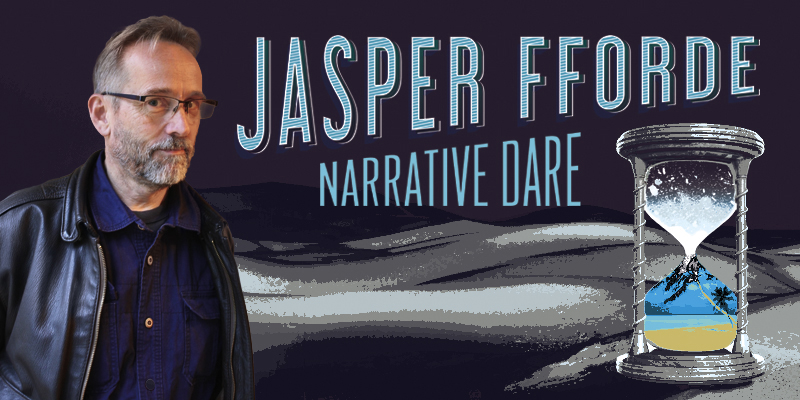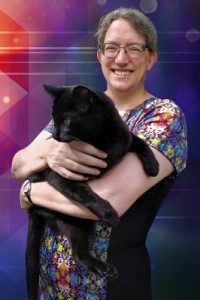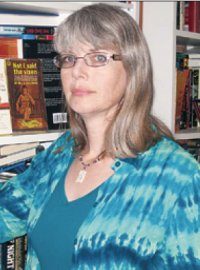Jasper Fforde: Narrative Dare

JASPER FFORDE was born January 11, 1961 in London. After graduating from Dartington Hall School, he worked in the film industry as a focus puller and cinematographer for nearly 20 years before becoming a novelist. His bestselling novels are “a joyful blend of Comedy-SF-thriller-Crime-Satire,” and his fans gather every May in Swindon, England for the annual “Fforde Ffiesta” celebrating his work.
Debut novel The Eyre Affair, a comic fantasy about the character Jane Eyre being kidnapped from the novel Jane Eyre, appeared in 2001 and won the Crawford Award for best first fantasy. It launched the Thursday Next series, which includes Lost in a Good Book (2002), Bollinger Everyman Wodehouse Prize for comic literature winner The Well of Lost Plots (2003), Something Rotten (2004), First Among Sequels (2007), One of Our Thursdays Is Missing (2011), and The Woman Who Died a Lot (2012). The related Nursery Crimes Division series – mysteries featuring characters from nursery rhymes – began with The Big Over Easy (2005) and The Fourth Bear (2006).
His novel Shades of Grey (2009) is set in an alternate dystopian England. The Last Dragonslayer (2010) is children’s fantasy, and began a series that continued with The Song of the Quarkbeast (2011) and The Eye of Zoltar (2014), with a concluding volume forthcoming. Early Riser, set in a world where humans hibernate through the winter, appeared in 2018. Another standalone, The Constant Rabbit, about anthropomorphic rabbits appearing in England, is forthcoming.
Fforde lives in Wales with his wife and daughters.
Excerpts from the interview:
“I’ve got several series going. The Thursday Next series is up to seven books, so that’s quite a long series, but telling stories about books is unlimited, really. In fact, some of the books in the Thursday Next series are telling stories about Thursday Next being in a book, so it’s gone weirdly loopy. Then I’ve got the Nursery Crimes Division, which is my Humpty Dumpty police procedural series. There was always meant to be a sequel to Shades of Grey, too. I’ve also got the Dragonslayer series, which is the middle grade, and that needs a fourth volume as well.
“Every series begins with a standalone. That’s how it seems to work. I innocently create this huge world that then seems very expansive and a good canvas to lay out more stories on. It seems a bit of a waste using those worlds for just one story. I write books using something I call ‘the narrative dare.’ That’s how I kick off – I just have an idea, and I dare myself to see it through. The Eyre Affair is about Jane Eyre being kidnapped out of Jane Eyre – out of the original manuscript. Everybody’s copies of page 210 have gone blank, and somebody has to get her back. That is essentially the narrative dare. I start off with that premise, and then I go, ‘How is this going to work? What is the world like where Jane Eyre can be kidnapped out of Jane Eyre? What is the mechanism by which this happens? Who gets her back?’ Suddenly this world starts appearing, and I write this bizarre, quite rich backstory to give credibility to that one rather daft idea.
“The dare just pops into my head. Some of them relate to other ones. Jane Eyre being kidnapped out of Jane Eyre relates to the Nursery Crimes series, because in both series I’m taking characters out of context. People know those characters already, so I’m moving the furniture around in their heads – the Three Bears and Humpty Dumpty and Jane Eyre are well defined, but I mess with them in a silly way.
“The narrative dare for Early Riser was to write a thriller set in a world in which humans have always hibernated. When choosing a narrative dare, you want one with really good legs. A dare like going down to the coffee shop and buying a coffee and a croissant isn’t really a major narrative dare. When I come across a dare that has good legs, it’s very exciting. The idea for Early Riser has a lot of legs to it. I’ve been talking about it at readings. ‘What’s the most important word in this sentence: Write a thriller set in a world in which humans have always hibernated.’ Of course everyone gets it – it’s ‘always.’ That’s the important word. That’s the fun, to imagine we’re a species that evolved millions of years ago to hibernate through a dastardly winter. There is nothing like an inciting event, because we’ve always been like that. So we’re subtly different, somewhat physically, more so socially, and the technologies and everything have developed in slightly different ways. We are the same, but mildly different, and therein lies the fun and the discovery as I go through all these possible differences.
“When it comes to choosing a dare, it’s about what feels right. A lot of writing is just weighing up in your head what seems right. I had this notion that I wanted a sitcom to be looping while people were asleep. If somebody woke up from hibernation, or just fizzled to the surface a bit dangerously, they should have something that would put them back to sleep. I thought Bonanza was perfect for that. Some of it is thinking about what seems right, and a lot of it is balance and fit. When you’re writing and you’re creating backstory, characters, and situations, it’s just about trying to find that right feeling. Writing is a weird dark art.”
Interview design by Francesca Myman. Photo by Liza Groen Trombi.
Read the full interview in the April 2019 issue of Locus.
 While you are here, please take a moment to support Locus with a one-time or recurring donation. We rely on reader donations to keep the magazine and site going, and would like to keep the site paywall free, but WE NEED YOUR FINANCIAL SUPPORT to continue quality coverage of the science fiction and fantasy field.
While you are here, please take a moment to support Locus with a one-time or recurring donation. We rely on reader donations to keep the magazine and site going, and would like to keep the site paywall free, but WE NEED YOUR FINANCIAL SUPPORT to continue quality coverage of the science fiction and fantasy field.







